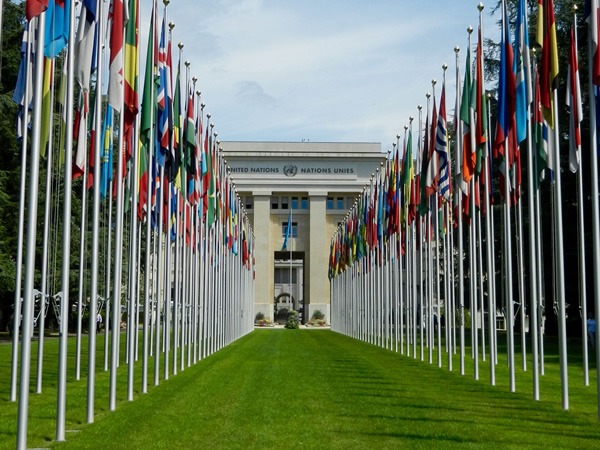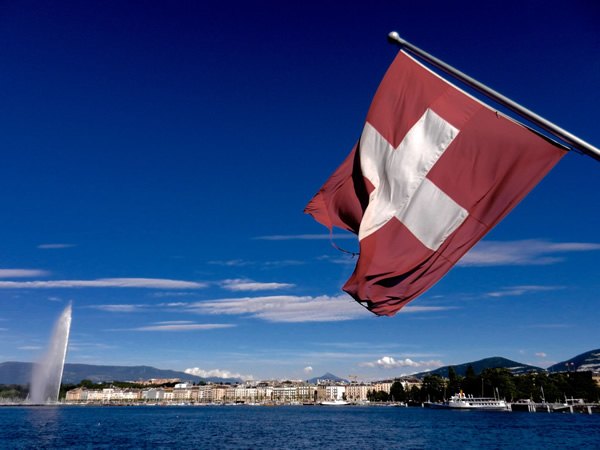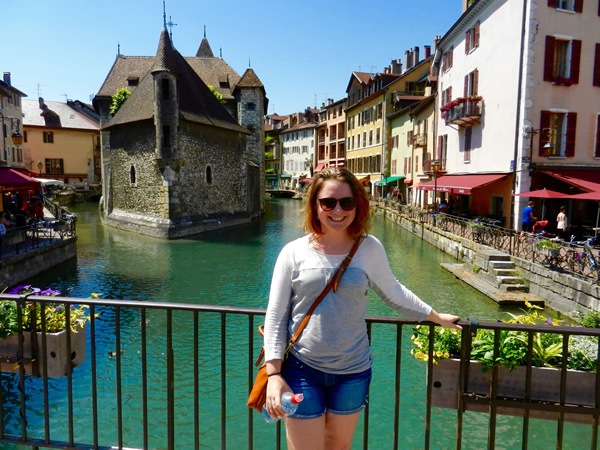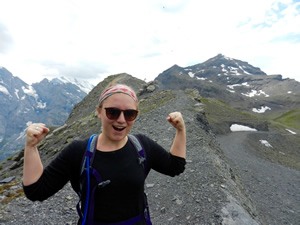The Ultimate Guide to Internships in Geneva, Switzerland
Exploring Opportunities at the United Nations Office in Geneva
Article and photos by Britnae Purdy

|
|
The United Nations office in Geneva.
|
I graduated from George Mason University with a Master of Arts in Global Affairs and minimal idea of where to go. In November, I started applying for jobs with abandon. While dispatching dozens of cover letters, resumes, and inquiries to potential employers, I came across the Program on Global Governance and Policy in Geneva, hosted by Duke University’s Sanford School of Public Policy. The program combined nine weeks of interning with a week of intensive classes. I specialized in Global Health in grad school. Yet, I lacked hands-on experience, so I was enamored when I saw that their Global Health track offered internships at the World Health Organization Headquarters. I applied more on a whim — after all, this was a top-rated program at an incredible university, and I was still getting rejected from entry-level job after entry-level job.
Two days before my graduation ceremony, I received the email. Miracle of miracles, Sanford had accepted me. My hands shook as I read the details of the acceptance. I had a little over a month to decide.
I left the decision to the last minute, the practical part of my brain arguing that unemployment was no time to jet off to Europe. At the same time, part of me desperately wanted to follow my dreams and yearned for a chance to intern in Geneva, home to the United Nations, World Health Organization, World Trade Organization, and numerous other intergovernmental organizations. When the acceptance deadline came and I still had no job offer, I decided to take the leap. A month later, I earned a spot interning at the WHO — a dream come true.

|
|
Geneva from the lake.
|
Dreams, however, often come with price tags. Swarms of interns flock to Geneva, especially during the summer. Though many of these interns would describe their experiences as priceless, an equal number reflect being shocked by the price tag involved in living and working in one of the most expensive cities in the world. I’m not going to lie — doing an unpaid internship in a city where a personal pizza will run you $20 is not easy. Further, venturing to a foreign city, especially one as bustling and diverse as Geneva, can be somewhat intimidating. But with proper planning and nerve, I found the experience incredibly rewarding. Below, I’ve offered a variety of tips to help you get the most out of your internship and your budget.
Preparing
-
Get Your Visa
First things first: Will you need a work visa? If you’re coming from outside the Schengen region and plan to be in-country for more than 90 days, you likely will. Assume you’re interning with a United Nations agency (that includes the WHO). In that case, it’s better to err on the side of caution and seek a visa or at least speak to someone at the Swiss consulate. To secure a work visa, you must have your airline tickets booked (including the return trip), a letter of offer from your intern agency, an address at which you intend to reside, and copies of your passport. Switzerland has been changing its travel requirements recently, so it’s vital to check with your nearest Swiss embassy. For example, partway through applying for my visa, Switzerland changed its regulations to require an in-person application — meaning I had to make an emergency overnight trip to my district consulate in Atlanta.
-
Pack for the Weather
In Geneva, the weather is typically moderate, ranging from 20-40 degrees Fahrenheit in the winter to 60-90 degrees in the summer. That said, when I interned in Geneva, I spent the first two months enjoying 75-degree days and a cool breeze at night. However, as soon as July arrived, we were struck with the hottest temperatures Geneva had seen in over a decade, with two straight weeks of 100+ degree weather. Keep in mind that many buildings in Switzerland do not have air conditioning, as this extreme weather is rare. Packing layers and a mix of casual and professional clothing is best. Bring a rain jacket and warmer layers to visit the mountain areas of Switzerland, where you can see snow year-round. A simple trick for packing light: make sure everything you bring can do double duty, e.g., tops you can wear with shorts on the weekend and layer under a blazer for work days.
-
Start Looking for Housing Early
Housing, by far, will be your most significant source of stress. Unless you’re coming from a major city, rent prices will seem shockingly high, so allocate a decent amount of your budget to accommodation. I recommend you begin looking at least two months before you’re scheduled to arrive in the city. When you accept an internship, ask to join any intern Facebook groups, including the WHO Intern group or the larger Geneva Interns Association (GIA) group. Duke provides a valuable housing list, including foyers. With foyers and other student housing, it is essential to start looking early, as they fill up quickly during the summer. Public transportation in Geneva is convenient and easy to navigate; the city is relatively small, so don’t worry if your accommodation is on the town's border.
Eating
-
Pack a Reserve of Food
I knew food was one of the easiest ways to cut my budget, so I strategized early. I dedicated a decent amount of my suitcase to instant oatmeal and granola bars. I knew from travel experience that American “snack” favorites aren’t always easy to find abroad. My 50-cent granola bars were a cheaper breakfast than the typical cappuccino and pastry I would find at a café, and my instant oatmeal made for good comfort-food dinners. They came in especially handy when I landed in Geneva on a Sunday morning, learning, belatedly, that the vast majority of grocery markets are closed on Sundays. As a coffee addict, I ended up incredibly grateful that I threw a couple packets of Starbucks instant coffee in my suitcase. Not only did this save more money, but a strong cup of American Joe eased my homesickness. When you do eat out, pizza and kabobs are the cheapest options around the city.
-
Eat Strategically at Work
UN agencies generally offer an internship special for the cafeteria lunch, and I took advantage of the benefit. For the equivalent of $10, I stocked up on a filling, healthy lunch — and yes, occasionally stashed some goodies in my purse for later. This way, I could eat a lighter dinner but still socialize with coworkers over food during this lunch hour. The UN and WHO also frequently host lunchtime or dinner events with free food or beverages. Seek these out and make sure they’re on your schedule. Free food plus lectures from experts! What more could you want?
-
Shop like a Sleuth
Go to France for your groceries. Especially recently, as the dollar has been strong against the euro. The first time I heard that advice, I thought it was a gross exaggeration. Still, since Geneva is nestled right up against the French border, it’s simple to cross the border to fill up on groceries, which are typically much cheaper in France. Though these are rarely checked, bring your passport, visa, and Euros, not Swiss francs. If shopping in Geneva, the discount grocer Denner is an excellent place to buy dry goods and cheap wine, while the Migros at the central train station is one of the few grocery stores that stay open past 5 p.m. on Sunday. Note: most stores remain open only until 9 or 10 on Thursday evenings. Expect grocery stores to be packed on that day. For fresh produce, I highly recommend visiting the weekly Plainpalais farmers market.
Working
-
My Advice
Here is where I tell you that you’re in Geneva for a reason — to work your butt off at an internship and learn as much as you possibly can. Do your work quickly and diligently; don’t be afraid to ask questions if you don’t understand something. Don’t be the last one in the office each morning or the first to leave at night. If someone approaches you with extra work, your answer should always be “yes.” Most employers understand that part of the Geneva interning experience is cultural, not just professional. Ask your coworkers about living in the city and their recommendations for local activities. Employers are generally OK with requesting one or two days off during your internship. Take advantage of cheap flight services such as EasyJet and explore Europe more. Such travel might seem frivolous for someone on a budget. Still, by carefully booking flights and staying in hostels, you can have some fantastic experiences for a relatively inexpensive price.

|
|
Author traveling while on her Geneva internship.
|
-
Network
When I first started interning at the WHO, I was entirely star-struck. I was surrounded by global health professionals at the top of their game; I was terrified of sounding like an ignorant intern. However, I quickly found that my coworkers, while busy, were also very willing to share their experiences and advice. Before leaving your internship, reach out to everyone in your department and ask if they could spare a few minutes to grab coffee with you. Ask them about their daily work, goals, and background — folks love talking about themselves, and you’ll likely learn a ton and make great new connections.
-
Find a Group for a Sense of Community
A greater sense of community is one of the best things about working in a city with many other interns. Find out if your organization has an intern group or join the Geneva Interns Association. Even if there are just a few different interns in your department, seek them out, and you’ll meet some interesting people. Some may become friends, some travel buddies, some may show you how and where to explore the city, and some can even serve as mentors. I’m an introverted person, but I found that the interns in Geneva, in general, are open and friendly; people are there for a short time, so they don’t waste breath with pettiness. Interns will have gone through homesickness, embarrassing culture shock, and learning something astonishing. Becoming close with fellow interns reminds you that you’re not alone, no matter how far you are from your family.
Check out Finding Internships in Switzerland: Tips and Resources for more resources.

|
Britnae Purdy studied abroad in Havana, Cuba, with George Mason University in 2014, in numerous European capital cities with the University of Mary Washington in 2012, and with Duke University in Geneva, Switzerland in 2015. She has a BA in International Affairs/Women's and Gender Studies from UMW and an MA in Global Affairs from GMU. At the same time, she is starting her first year as a Master of Public Health distance-learning student at the London School of Hygiene and Tropical Medicine.
|
|
